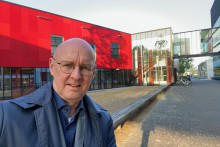In essence, one might say that Simon Oleszkiewicz examines various interrogation methods, but ‘the word interrogation has a negative connotation because it implies pressure and harsh methods,’ warns the researcher from the UT group Psychology of Conflict, Risk and Safety. Which is why we talk of intelligence gathering, a field that has been in the spotlight of academics since rather recently.
'The torture program was completely flawed'
‘Interest in the field arose because of the unethical and harsh interrogation methods that the US military were using after the 9/11 attack,’ explains Oleszkiewicz. ‘This concerned mainly their prisoners abroad, such as in Guantanamo, where prisoners were tortured and mistreated. They were waterboarded, they were locked in rooms with insects, dogs barking in their faces and so on. The intention behind these dehumanizing techniques was to produce actionable intelligence, but this approach is in fact counter effective. Being under pressure actually reduces our ability to draw information from memory. If we are tortured, we will only provide information that we think the interrogator is after, that we think will allow us to escape the situation. Torture is effective to gain compliance, to make subjects say what you want them to say. You can’t rely on the information obtained through torture, it is too questionable. In other words: the torture program was completely flawed.’
Ethical and effective
According to the scientist, the aftermath of the 9/11 attacks highlighted a big gap in science and knowledge base for intelligence gathering. ‘There was actually no research into what are effective and ethical forms of intelligence gathering,’ he says. ‘In 2009, president Obama gave an executive order to fund research into this topic and, thanks to that, researchers like me began creating scientific knowledge on intelligence interviewing, understanding the underlying principles, what techniques are effective, understanding why particular interrogators were consistently successful and trying to find the systematics behind their approaches. We want to nail down what works and what doesn’t.’
'I was working with criminals, with people who I – beforehand - thought would be monsters'
As president Obama was creating the FBI-led High-Value Detainee Interrogation Group, encouraging research into new forms of intelligence gathering, Simon Oleszkiewicz, still in his home country of Sweden, was busy with another fascinating research topic: deception detection. ‘At the mental hospital I was working with criminals, with people who I – beforehand - thought would be monsters. But being around them, I realized they were not monsters. They had problems that had led them to a negative state of mind, but most of them were not bad all through their core. In my opinion they were mostly extreme deviations of normal personality traits. At least I perceived it that way and I wanted to understand it better. I started a psychology course and found a study on deception detection. It really blew my mind. The researchers showed how bad we are in detecting deception, and their comprehensive study was a master challenge to a common quick fix in policing; the belief that we can immediately spot a liar based on his or her bodily reactions. Yet, there is still such a drive in humanity to be able to detect deception. That study really opened my eyes. I found this very fascinating and I looked up my professor Pär-Anders Granhag in Gothenburg who was – and still is – an expert on deception. It was he who suggested a new research line for me: intelligence gathering.’

Learning from the German Luftwaffe
And how better to start learning about successful intelligence gathering methods than by studying the techniques of so called ‘Master Interrogator’, Hanns Scharff? Scharff was a German Luftwaffe interrogator during the Second World War. His ability to gain information from captured fighter pilots without the use of any physical (or unpleasant) means was legendary. In 1948, Scharff was even invited to Pentagon to give lectures on his interrogation techniques. The U.S. military later incorporated his methods into its curriculum at its interrogation schools and many of them are still taught in the US Army. The ‘Scharff technique’ is also the base of the training that Simon Oleszkiewicz is currently developing for police and military officers.
‘People used to accept that Scharff’s effectiveness was due to his personality and natural ability to befriend his enemies,’ says the UT researcher. ‘But that is not the full story.’ Oleszkiewicz has studied the German interrogator’s methods and he uncovered specific tactics behind Scharff’s success. ‘The key to Scharff’s success was that he made the prisoners believe that their defense strategies were still working well enough, and he capitalized on that.’ He used a friendly approach, bonding with the prisoners. He’d take them for walks, get them cigarettes and let them read newspapers. Besides kindness and respect, Scharff used another important tool: storytelling. ‘He never asked explicit questions – because that would show what information he was after,’ explains Oleszkiewicz. ‘Instead, he would tell a story, giving the prisoner the opportunity to add details to it, without fully understanding when they contributed to the story.’
An Example of successful intelligence gathering by Hanns Scharff
(described in book The interrogator: The story of Hanns Joachim Scharff master interrogator of the Luftwaffe. By Toliver, 1997, page 103)
Conversation between: Hanns Scharff and captured pilot Lieutenant Richard Price Jr.
Setting: a long conversation during a walk outside, preceded by a discussion about the different ways of life between Americans and Europeans
True purpose of the conversation: to find out why American fighter pilots fire white tracer bullets right before they return to their home base
Scharff: ‘It is too bad America did not have more experience in working off English bases as it sometimes overloads your industry back home, such as they now have run out of the chemicals they use to make red tracer bullets. Those white ones you fellows are using in your dogfights must be rather hard to follow with your eyes so you have to shoot a whole string of them…’
Price: ‘Ha! You’re nuts, Hanns, they haven’t run out of much of anything back home. White tracers are just our own way of warning ourselves. When ten of them, or any big batch of them shows up, you know you’d better start heading for home pronto because you have just shot out your last ammo. The guns are empty.’
Police, military, FBI
Using these ‘secrets of the master interrogator’ and his other work, Oleszkiewicz is now working with law enforcement agencies in the US, the Netherlands and Scandinavia, including the Dutch national police and soon hopefully also a new research contract with the FBI. The scientist is developing evidence-based training for these professionals and has already trained and lectured about the technique to police and military officers in Sweden, Norway, Denmark, the US, the UK, and South Korea. ‘We’ve shown that those who we’ve been trained in our techniques, outperform their colleagues,’ he says. ‘What we’ve observed is that, if the training is applied, the interviews are shorter, more new information is collected and less questions are asked during the interviews. The professionals tend to focus on the motivation of the interviewee, but with our training their focus turns more to the interaction or relationship, which seems to relieve some pressure from the interviewee.’
'The interview needs to be built on a mutual respect'
Is focusing on the interaction the key? What constitutes an effective interrogation? ‘Positive interview atmosphere in which the interrogator honors the subject’s autonomy and emphasizes shared challenges. Saying things such as “I see that you are in a difficult position, but so are we.” The interrogator should make sure that the subject knows that he or she has a freedom of choice, that they are not forced to respond if they do not wish to do so. The interview needs to be built on a mutual respect,’ answers Oleszkiewicz.

‘There is no simple trick to it,’ he adds. ‘It’s about finding the topic that is important to the subject and being willing to tactically share knowledge. For example, an FBI agent Ali Soufan described his interrogation of Bin Laden’s lieutenant Khalid Shaikh Mohammed. Mohammed was very resistant. He was waterboarded 183 times by the CIA and didn’t give up any information, and so Soufan knew he needed a different approach. During an interview, he called Mohammed by a nickname only his mother used. By doing so, the prisoner believed that Soufan must have much more information than he actually had because he knew about this nickname that nobody except his own mother knew.’
The real world
Working with the police and other practitioners is what drives Simon Oleskiewicz’s research. ‘My research focus always comes from real examples, from the field,’ he says. ‘But I see myself in academia. This is where I found my passion. My immediate goal is to establish myself as a researcher, to get funds to investigate my own ideas. I want to continue with applied research and see how much I can improve practice. I want my work to be helpful to professionals, rather than criticizing what they do. I firmly believe that if you want to be a good interrogator, you need the real-life experience, you have to allow yourself to make errors and then adjust to improve yourself. The people I work with have that. I can never beat them in interrogation skills, but I believe I can help explain why their methods work so that they can use them even more effectively. I want to see the effects of my work in practice, but I want to keep my feet in academia.’
Simon Oleszkiewicz (1982):
2018 – now Assistant Professor, Psychology of Conflict, Risk and Safety group at the University of Twente
2018 Early Career Award, European Association of Psychology and Law
2016 – 2018 Postdoctoral researcher, Iowa State University
2016 PhD in Psychology, University of Gothenburg, Sweden








